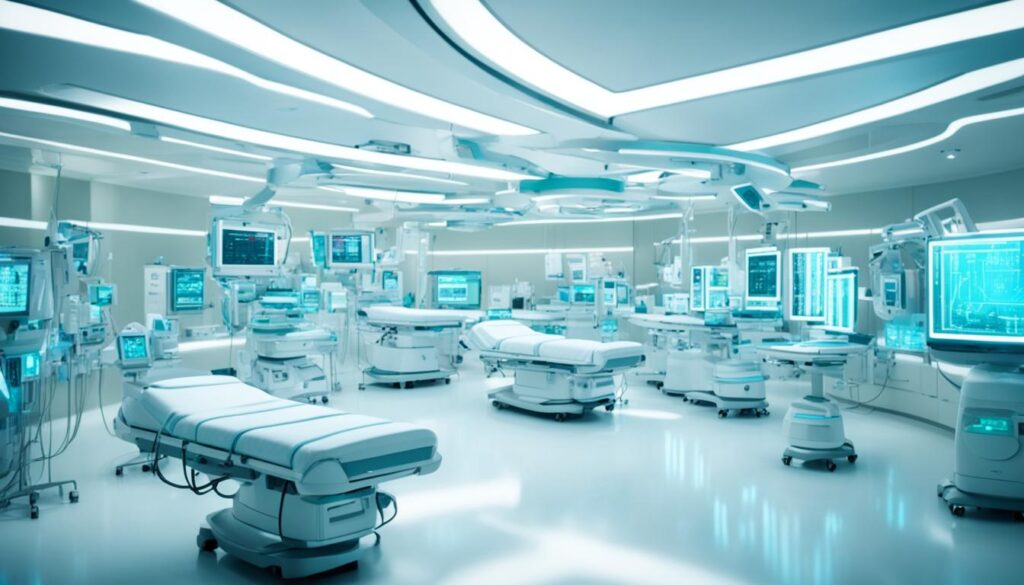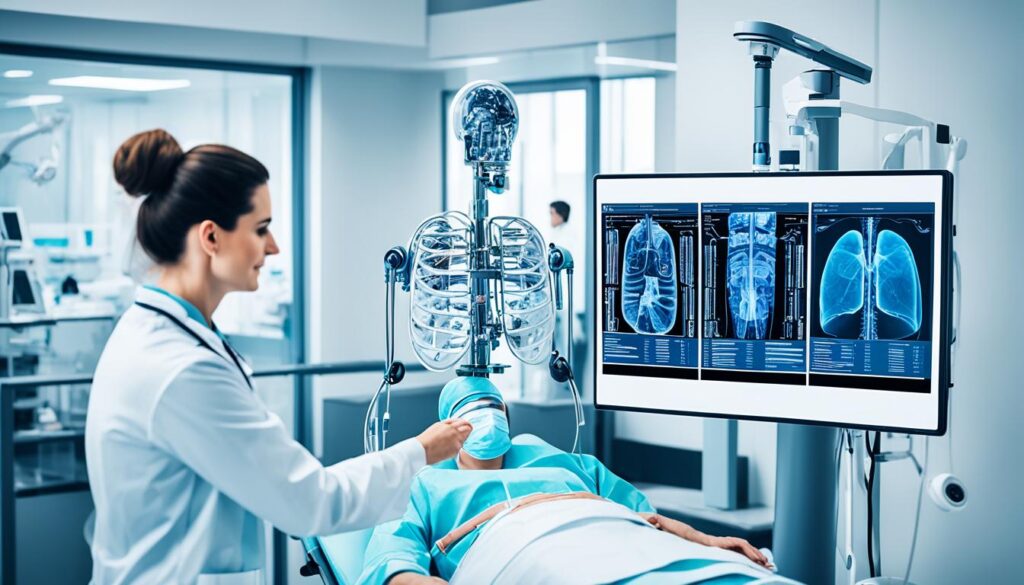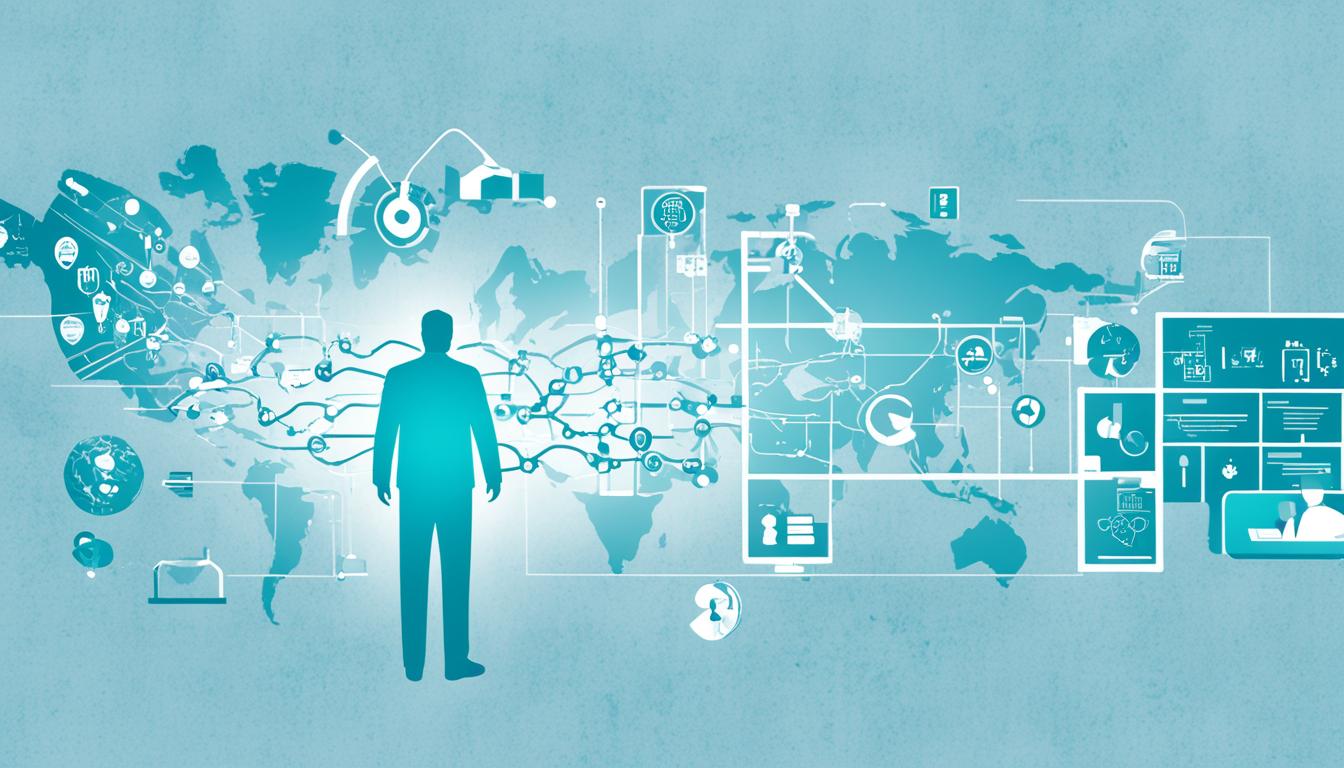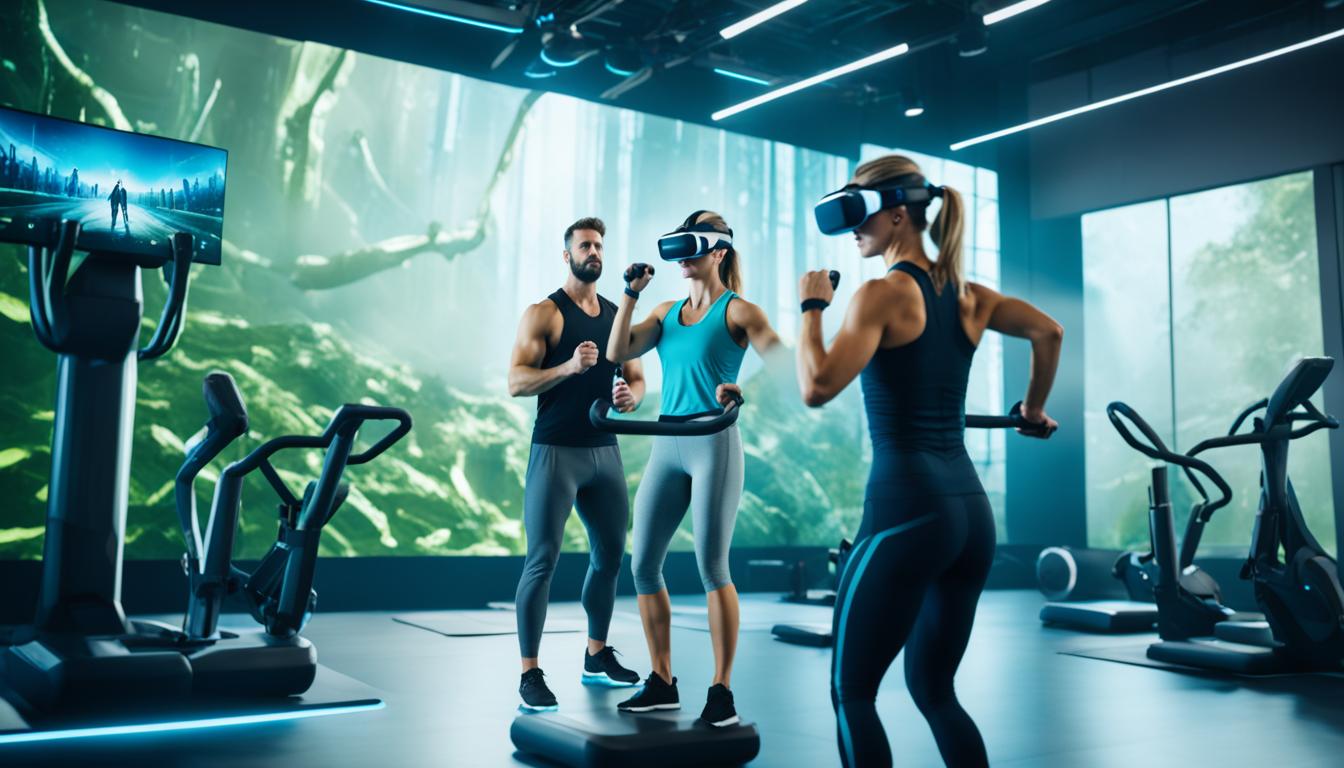Technology has transformed every aspect of our lives, from communication to transportation. But what about healthcare? Have you ever wondered how technology is revolutionizing patient care, diagnostics, and treatment methodologies? How are innovative healthcare technologies shaping the future of medicine? Let’s dive into the incredible world of healthcare technology trends and discover the digital health solutions that are changing the way we approach healthcare.
Key Takeaways:
- Technology has revolutionized patient care, diagnostics, and treatment methodologies in healthcare.
- Advanced imaging techniques like MRI, CT scans, and ultrasound have enhanced disease detection and accuracy.
- Artificial intelligence (AI) and machine learning analyze medical data for pattern recognition and early diagnosis.
- Robotic-assisted surgeries have increased precision and reduced invasiveness.
- Telemedicine and wearable devices provide remote monitoring and continuous care.
Impact of Technology on Diagnostic Procedures
Technology has had a profound impact on diagnostic procedures in healthcare, revolutionizing the way illnesses are detected and patients are evaluated. The advancements in diagnostics technology and the integration of advanced imaging techniques have significantly improved the accuracy and efficiency of disease detection.
One of the most remarkable advancements in diagnostics technology is the utilization of advanced imaging techniques, including MRI, CT scans, and ultrasound. These imaging technologies offer healthcare professionals a detailed view of the internal structures and organs, enabling earlier and more accurate diagnosis of various medical conditions.
The integration of artificial intelligence (AI) and machine learning has taken diagnostics technology to new heights. These technologies have the ability to analyze vast amounts of medical data and identify complex patterns that may not be discernible to the human eye. By leveraging AI algorithms, medical professionals can uncover subtle details and relationships in the data, leading to more precise evaluations and improved patient outcomes.
| Advancements in Diagnostic Procedures | Key Benefits |
|---|---|
| Advanced Imaging Techniques |
|
| Integration of AI and Machine Learning |
|
“The integration of technology in diagnostic procedures has significantly improved patient outcomes by enabling earlier and more accurate disease detection.”
With the continued advancement of technology, the future of diagnostics holds even more promise. Innovations in diagnostics technology will continue to push the boundaries of disease detection, enhancing the accuracy, speed, and accessibility of diagnostic procedures. By harnessing the power of technology, healthcare professionals can provide more targeted and effective treatments, ultimately improving patient care and outcomes.
Transforming Treatment Methodologies
Technological advancements have been instrumental in transforming treatment methodologies in healthcare. These innovations have improved patient outcomes, revolutionized surgical procedures, and extended care beyond traditional hospital settings.
Robotic-Assisted Surgeries: Precision and Efficiency
Robotic-assisted surgeries have ushered in a new era of precision and efficiency in surgical procedures. With the aid of robotic systems, surgeons can perform intricate operations with unparalleled accuracy. The advanced robotics technology allows for minimally invasive procedures, resulting in reduced recovery times for patients.
In addition to greater precision, robotic-assisted surgeries offer other benefits such as improved visualization and enhanced dexterity. Surgeons can operate with more precision even in hard-to-reach anatomical areas, leading to better outcomes for patients.
Telemedicine and Wearable Devices: Extending Care Beyond Hospital Walls
Technology has enabled healthcare providers to extend care beyond traditional hospital walls through telemedicine and wearable devices. Telemedicine allows for remote consultations, enabling patients to receive medical advice, diagnoses, and treatment plans from the comfort of their own homes.
Wearable devices, such as smartwatches and fitness trackers, provide continuous monitoring of patients’ health statuses. These devices collect data on vital signs, activity levels, and sleep patterns, providing valuable insights to healthcare professionals. This remote monitoring enables early intervention and proactive management of chronic conditions, leading to better health outcomes.
Benefits of Treatment Innovations
“The integration of technology into treatment methodologies has revolutionized healthcare delivery. Robotic-assisted surgeries, telemedicine, and wearable devices have reshaped patient care, improving precision, accessibility, and patient outcomes.” – Dr. Emily Johnson, Chief Medical Officer at MedicalTech Solutions.
The advancements in treatment methodologies driven by healthcare technology have significant benefits:
- Improved surgical outcomes with reduced invasiveness and faster recovery.
- Enhanced patient experience through remote consultations and continuous care.
- Expanded access to healthcare services, particularly in geographically isolated areas.
- Proactive management of chronic conditions through remote monitoring.
These treatment innovations have transformed healthcare delivery, making it more efficient, accessible, and patient-centric.

| Treatment Methodologies | Benefits |
|---|---|
| Robotic-Assisted Surgeries |
|
| Telemedicine |
|
| Wearable Devices |
|
Enhancing Healthcare Delivery and Accessibility
Technology has played a crucial role in driving healthcare innovation, resulting in advancements that have enhanced the delivery of healthcare services and improved accessibility for patients. Two notable technological advancements in this regard are telemedicine and remote patient monitoring.
Telemedicine has revolutionized the way healthcare is delivered, especially for underserved or geographically isolated areas. With telemedicine, patients can now receive medical consultations without physically visiting a healthcare facility. This technology-driven approach allows doctors and specialists to diagnose, treat, and even prescribe medication remotely, ensuring that patients receive timely and convenient healthcare services.
Remote patient monitoring is another significant development that has transformed the healthcare landscape. Through wearable devices and connected sensors, healthcare providers can now monitor patients’ vital signs and health conditions remotely. This continuous monitoring not only allows for early detection of potential health issues but also enables healthcare professionals to intervene and provide timely interventions when necessary. Remote patient monitoring is particularly valuable for individuals with chronic conditions who require frequent monitoring and personalized care.
To illustrate the impact of telemedicine and remote patient monitoring, consider the following statistics:
| Telemedicine | Remote Patient Monitoring |
|---|---|
| 👩⚕️ Over 90% of healthcare executives believe telemedicine is a key driver of healthcare transformation. | 📈 The global market for remote patient monitoring is projected to reach $117.1 billion by 2026. |
| 🌐 The adoption of telemedicine in the United States has grown by over 30% during the COVID-19 pandemic. | 🏥 Remote monitoring reduces hospital admissions by up to 65% and emergency department visits by 45%. |
Healthcare IT innovations have also played a fundamental role in enhancing healthcare delivery and accessibility. One notable innovation is the implementation of electronic health records (EHRs) that enable healthcare providers to store and access patient information digitally. EHRs streamline data management and facilitate collaborative care by allowing different healthcare professionals to access a patient’s medical history and treatment plans more efficiently. The use of EHRs significantly reduces errors, improves coordination across care teams, and ultimately enhances patient outcomes.
Overall, technology-driven healthcare innovation, such as telemedicine, remote patient monitoring, and healthcare IT innovations like EHRs, has transformed the way healthcare is delivered and accessed. Patients can now receive medical consultations remotely, have their vital signs monitored consistently, and benefit from streamlined data management. These advancements contribute to better patient experiences, improved outcomes, and ultimately, a more efficient and effective healthcare system.
Addressing Challenges and Considerations
While technology brings remarkable advancements to healthcare, it also poses several challenges and considerations that need careful attention. These challenges include data privacy and security, interoperability of systems, ethical use of AI, and equitable healthcare access.
Data Privacy and Security
Data privacy and security are of utmost importance in healthcare technology. Protecting patient confidentiality and ensuring the security of sensitive health information is crucial. Stricter regulations and robust cybersecurity measures must be implemented to safeguard patient data and prevent unauthorized access.
Interoperability of Systems
Interoperability refers to the ability of different healthcare systems and technologies to seamlessly share and exchange data. Achieving interoperability is essential for healthcare organizations to access complete patient records, avoid duplicative tests, and provide comprehensive care. Standardization of data formats and protocols is necessary to overcome the current barriers to interoperability.
Ethical Use of AI
As artificial intelligence (AI) continues to advance in healthcare, ethical considerations surrounding its use become paramount. The responsible and ethical use of AI in decision-making processes, such as diagnosis and treatment recommendations, must be prioritized. Transparency, accountability, and unbiased algorithms are crucial elements in ensuring the ethical deployment of AI in healthcare.
Equitable Healthcare Access
Equitable access to technology-driven healthcare services is vital to ensure that all individuals have equal opportunities to benefit from innovative healthcare technologies. Addressing disparities in healthcare access requires efforts to bridge the digital divide, promote affordability, and provide training and support to underserved communities.
By addressing these challenges and considerations, the healthcare industry can harness the full potential of technology while ensuring patient privacy, promoting interoperability, and ethically deploying AI. This will contribute to a more equitable and patient-centric healthcare system.

Conclusion
The role of technology in healthcare innovation is paramount in transforming the landscape of patient care. With advancements in healthcare technology, we have witnessed significant improvements in diagnostics, treatment methodologies, and overall healthcare delivery. From the utilization of advanced imaging techniques to the implementation of telemedicine and wearable devices, technology has enhanced the accuracy, accessibility, and outcomes of patient care.
However, as we embrace these innovations, challenges such as data privacy and ethical considerations must be addressed to ensure responsible integration. Data privacy measures should be established to protect patient confidentiality and safeguard sensitive information. Additionally, the ethical use of artificial intelligence in healthcare decision-making processes necessitates careful consideration and appropriate regulation.
Looking forward, technology continues to hold immense potential in driving further advancements in healthcare. It will continue to play a pivotal role in improving patient care, fostering research endeavors, and ultimately working towards a healthier global population. As we navigate the ever-evolving landscape of healthcare innovation, the responsible integration of technology remains key in unlocking its full potential.
FAQ
How has technology impacted diagnostic procedures in healthcare?
What advancements have technology brought to treatment methodologies?
How has technology enhanced healthcare delivery and accessibility?
What challenges and considerations should be addressed in healthcare technology adoption?
What is the role of technology in healthcare innovation?
Source Links
- https://www.linkedin.com/pulse/role-technology-healthcare-innovation-jeni-mizpha-s-n5nyc
- https://www.linkedin.com/pulse/innovation-idea-healthcare-mortals-part-1-max-ebong
- https://www.studocu.com/ph/document/bulacan-state-university/the-contemporary-world/the-role-of-technology-in-healthcare-innovation/67967356



